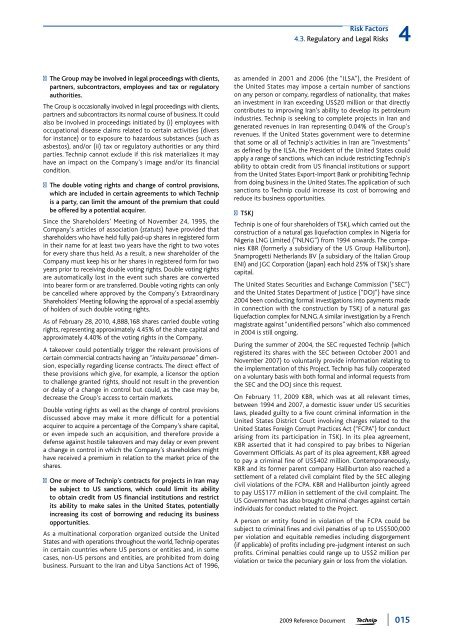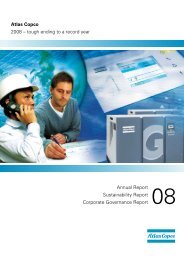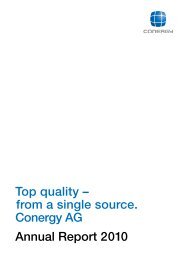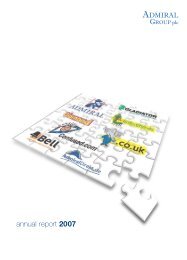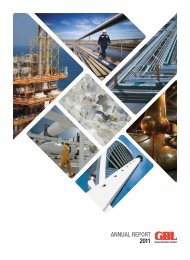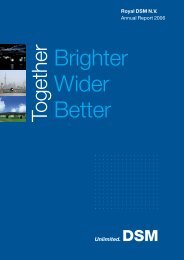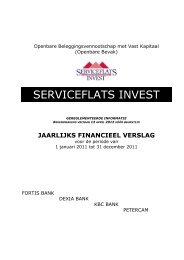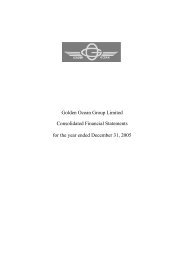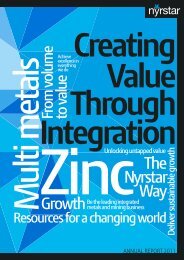Reference Document
Reference Document
Reference Document
Create successful ePaper yourself
Turn your PDF publications into a flip-book with our unique Google optimized e-Paper software.
Risk Factors<br />
4.3. Regulatory and Legal Risks 4<br />
The Group may be involved in legal proceedings with clients,<br />
partners, subcontractors, employees and tax or regulatory<br />
authorities.<br />
The Group is occasionally involved in legal proceedings with clients,<br />
partners and subcontractors its normal course of business. It could<br />
also be involved in proceedings initiated by (i) employees with<br />
occupational disease claims related to certain activities (divers<br />
for instance) or to exposure to hazardous substances (such as<br />
asbestos), and/or (ii) tax or regulatory authorities or any third<br />
parties. Technip cannot exclude if this risk materializes it may<br />
have an impact on the Company’s image and/or its fi nancial<br />
condition.<br />
The double voting rights and change of control provisions,<br />
which are included in certain agreements to which Technip<br />
is a party, can limit the amount of the premium that could<br />
be offered by a potential acquirer.<br />
Since the Shareholders’ Meeting of November 24, 1995, the<br />
Company’s articles of association (statuts) have provided that<br />
shareholders who have held fully paid-up shares in registered form<br />
in their name for at least two years have the right to two votes<br />
for every share thus held. As a result, a new shareholder of the<br />
Company must keep his or her shares in registered form for two<br />
years prior to receiving double voting rights. Double voting rights<br />
are automatically lost in the event such shares are converted<br />
into bearer form or are transferred. Double voting rights can only<br />
be cancelled where approved by the Company’s Extraordinary<br />
Shareholders’ Meeting following the approval of a special assembly<br />
of holders of such double voting rights.<br />
As of February 28, 2010, 4,888,168 shares carried double voting<br />
rights, representing approximately 4.45% of the share capital and<br />
approximately 4.40% of the voting rights in the Company.<br />
A takeover could potentially trigger the relevant provisions of<br />
certain commercial contracts having an “intuitu personae” dimension,<br />
especially regarding license contracts. The direct effect of<br />
these provisions which give, for example, a licensor the option<br />
to challenge granted rights, should not result in the prevention<br />
or delay of a change in control but could, as the case may be,<br />
decrease the Group’s access to certain markets.<br />
Double voting rights as well as the change of control provisions<br />
discussed above may make it more difficult for a potential<br />
acquirer to acquire a percentage of the Company’s share capital,<br />
or even impede such an acquisition, and therefore provide a<br />
defense against hostile takeovers and may delay or even prevent<br />
a change in control in which the Company’s shareholders might<br />
have received a premium in relation to the market price of the<br />
shares.<br />
One or more of Technip’s contracts for projects in Iran may<br />
be subject to US sanctions, which could limit its ability<br />
to obtain credit from US financial institutions and restrict<br />
its ability to make sales in the United States, potentially<br />
increasing its cost of borrowing and reducing its business<br />
opportunities.<br />
As a multinational corporation organized outside the United<br />
States and with operations throughout the world, Technip operates<br />
in certain countries where US persons or entities and, in some<br />
cases, non-US persons and entities, are prohibited from doing<br />
business. Pursuant to the Iran and Libya Sanctions Act of 1996,<br />
as amended in 2001 and 2006 (the “ILSA”), the President of<br />
the United States may impose a certain number of sanctions<br />
on any person or company, regardless of nationality, that makes<br />
an investment in Iran exceeding US$20 million or that directly<br />
contributes to improving Iran’s ability to develop its petroleum<br />
industries. Technip is seeking to complete projects in Iran and<br />
generated revenues in Iran representing 0.04% of the Group’s<br />
revenues. If the United States government were to determine<br />
that some or all of Technip’s activities in Iran are “investments”<br />
as defined by the ILSA, the President of the United States could<br />
apply a range of sanctions, which can include restricting Technip’s<br />
ability to obtain credit from US financial institutions or support<br />
from the United States Export-Import Bank or prohibiting Technip<br />
from doing business in the United States. The application of such<br />
sanctions to Technip could increase its cost of borrowing and<br />
reduce its business opportunities.<br />
TSKJ<br />
Technip is one of four shareholders of TSKJ, which carried out the<br />
construction of a natural gas liquefaction complex in Nigeria for<br />
Nigeria LNG Limited (“NLNG”) from 1994 onwards. The companies<br />
KBR (formerly a subsidiary of the US Group Halliburton),<br />
Snamprogetti Netherlands BV (a subsidiary of the Italian Group<br />
ENI) and JGC Corporation (Japan) each hold 25% of TSKJ’s share<br />
capital.<br />
The United States Securities and Exchange Commission (“SEC”)<br />
and the United States Department of Justice (“DOJ”) have since<br />
2004 been conducting formal investigations into payments made<br />
in connection with the construction by TSKJ of a natural gas<br />
liquefaction complex for NLNG. A similar investigation by a French<br />
magistrate against “unidentified persons” which also commenced<br />
in 2004 is still ongoing.<br />
During the summer of 2004, the SEC requested Technip (which<br />
registered its shares with the SEC between October 2001 and<br />
November 2007) to voluntarily provide information relating to<br />
the implementation of this Project. Technip has fully cooperated<br />
on a voluntary basis with both formal and informal requests from<br />
the SEC and the DOJ since this request.<br />
On February 11, 2009 KBR, which was at all relevant times,<br />
between 1994 and 2007, a domestic issuer under US securities<br />
laws, pleaded guilty to a five count criminal information in the<br />
United States District Court involving charges related to the<br />
United States Foreign Corrupt Practices Act (“FCPA”) for conduct<br />
arising from its participation in TSKJ. In its plea agreement,<br />
KBR asserted that it had conspired to pay bribes to Nigerian<br />
Government Officials. As part of its plea agreement, KBR agreed<br />
to pay a criminal fine of US$402 million. Contemporaneously,<br />
KBR and its former parent company Halliburton also reached a<br />
settlement of a related civil complaint filed by the SEC alleging<br />
civil violations of the FCPA. KBR and Halliburton jointly agreed<br />
to pay US$177 million in settlement of the civil complaint. The<br />
US Government has also brought criminal charges against certain<br />
individuals for conduct related to the Project.<br />
A person or entity found in violation of the FCPA could be<br />
subject to criminal fines and civil penalties of up to US$500,000<br />
per violation and equitable remedies including disgorgement<br />
(if applicable) of profits including pre-judgment interest on such<br />
profits. Criminal penalties could range up to US$2 million per<br />
violation or twice the pecuniary gain or loss from the violation.<br />
2009 <strong>Reference</strong> <strong>Document</strong><br />
015


